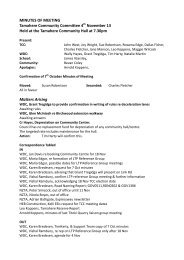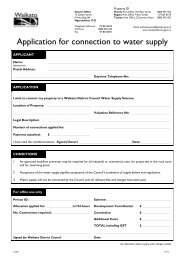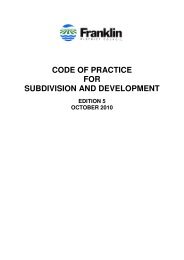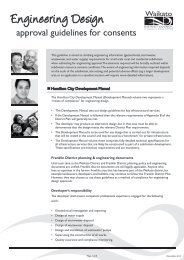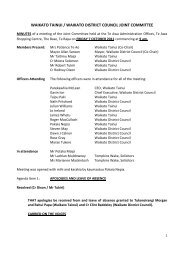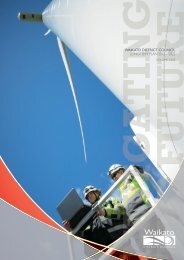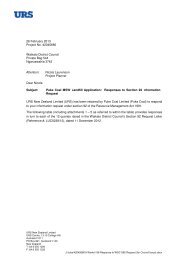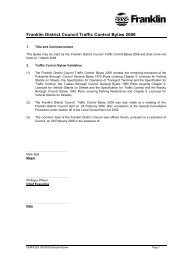1.2 Purpose of this waste assessment - Waikato District Council
1.2 Purpose of this waste assessment - Waikato District Council
1.2 Purpose of this waste assessment - Waikato District Council
- No tags were found...
You also want an ePaper? Increase the reach of your titles
YUMPU automatically turns print PDFs into web optimized ePapers that Google loves.
This means integrating <strong>waste</strong> into economic development plans and initiatives.Building on <strong>this</strong>, another key part <strong>of</strong> the zero <strong>waste</strong> approach is the view that <strong>waste</strong> is not just a councilproblem but ultimately resides with all sectors <strong>of</strong> the community to solve. While council, through its statutoryobligations and its traditional involvement in <strong>waste</strong> issues, has a natural leadership role, it is vital that part <strong>of</strong><strong>this</strong> role entails securing the commitment <strong>of</strong> all sectors, and ensuring that there are clear action plans for eachsector to follow.It is proposed that part <strong>of</strong> the council’s role may be to provide appropriate regulatory and economic incentiveframeworks to steer activity. 16In addition to the above it is proposed that council continue to provide a range <strong>of</strong> <strong>waste</strong> management andminimisation services similar to those in place currently.The council’s role is likely to be wide-ranging therefore and is expected to encompass the following:• Leadership in advocating zero <strong>waste</strong> in the community, including establishing partnerships and informationsharing as appropriate• Integration <strong>of</strong> zero <strong>waste</strong> into economic development, policy and planning• Integration <strong>of</strong> zero <strong>waste</strong> and local economic development impacts into council procurement policies• Development and monitoring <strong>of</strong> an appropriate framework <strong>of</strong> regulation and incentives• Monitoring and enforcement <strong>of</strong> <strong>waste</strong> related bylaws and legislation• Gathering, analysis and reporting <strong>of</strong> <strong>waste</strong> data• Provision (either directly or through contracts) <strong>of</strong> kerbside refuse and recycling collection services, transferstation operations, drop <strong>of</strong>f facilities, and communication and education• Development <strong>of</strong> new services as appropriate• Development <strong>of</strong> <strong>waste</strong> management and minimisation plans• Advocating policy positions to central government, neighbouring authorities, and private and communityorganisations that are consistent with the councils zero <strong>waste</strong> objectivesIt is expected that the implementation <strong>of</strong> these proposals will meet forecast demand for services as well assupport the council’s goals and objectives for <strong>waste</strong> management and minimisation. These goals and objectiveswill be confirmed as part <strong>of</strong> the development and adoption <strong>of</strong> the Waste Management and Minimisation Planprior to July 2012.16 Although there is concern that a stronger approach to regulatory and economic instrument tools might encouragemore unwanted activities such as illegal dumping, there is also a recognition that a stronger approach is probablyrequired to achieve a significant difference in <strong>waste</strong> going to landfill.46



